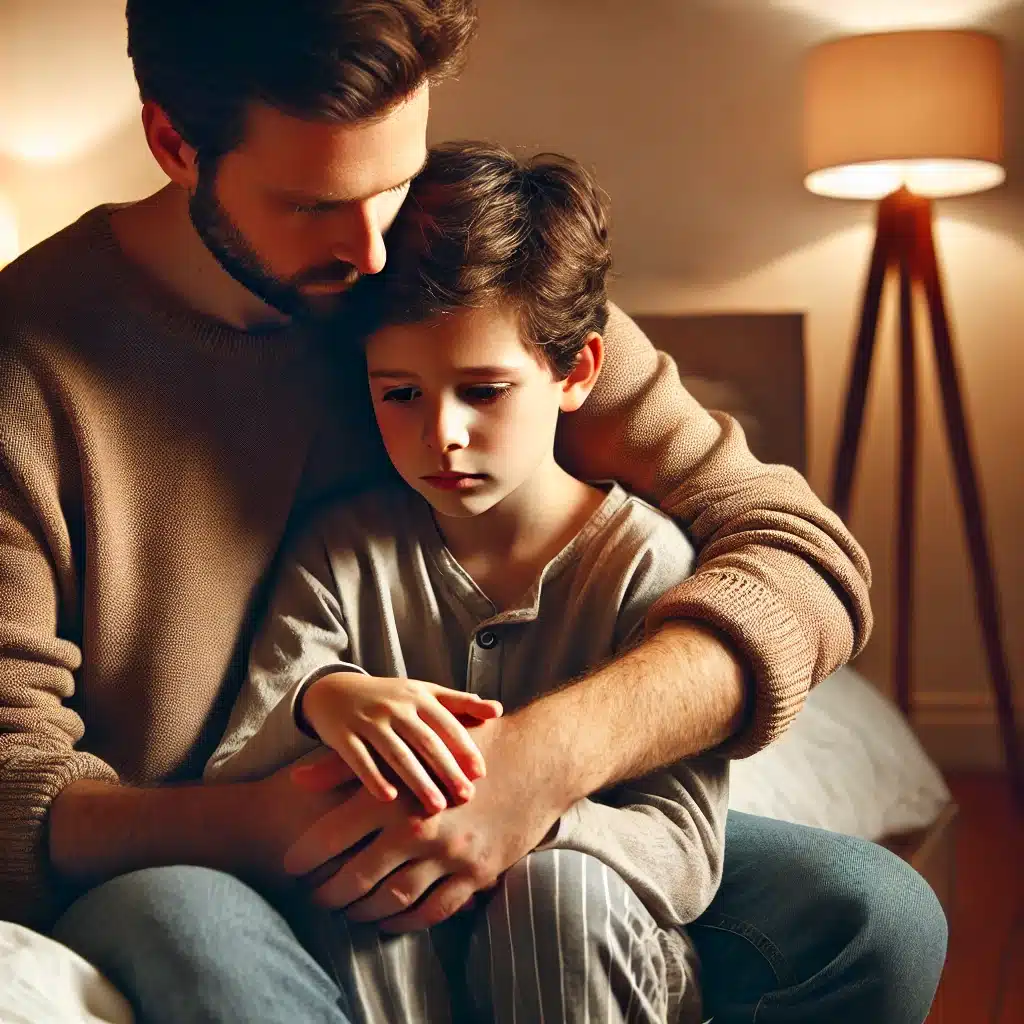How to Approach This Sensitive Issue With Empathy
Table of Contents
- Understanding Bedwetting Shame
- Why Bedwetting Stigma Exists
- Signs Your Child Feels Shame About Bedwetting
- The Hidden Cost of Bedwetting Shame
- How Shame Makes Bedwetting Worse
- Age-Specific Shame Reactions
- Family Dynamics and Bedwetting
- Building Confidence Despite Bedwetting
- When Professional Help Is Needed
- Creating a Shame-Free Home Environment
- Frequently Asked Questions
Understanding Bedwetting Shame
As a parent dealing with bedwetting, you handle the practical parts well – the laundry, the cleanup, the middle-of-the-night sheet changes. But there’s something deeper happening that many parents miss: shame.
Children with bedwetting carry invisible emotional weight. Even when parents stay calm and supportive, kids often develop feelings of embarrassment, guilt, and inadequacy. This shame can hurt your child more than the wet sheets ever will.
The reality: Most children with bedwetting believe something is wrong with them. They feel broken, different, and alone with their problem.
Why Bedwetting Stigma Exists
Historical Misunderstandings
For generations, people have misunderstood bedwetting. This creates lasting stigma that affects children today.
Common misconceptions include:
- Bedwetting means a child is lazy
- Parents caused bedwetting through poor training
- Children can control bedwetting if they try harder
- Bedwetting shows emotional or mental problems
Cultural Expectations
Society puts pressure on children to stay dry at night. Many cultures view bladder control as a major childhood milestone. When children can’t meet this expectation, they feel like failures.
Societal pressures:
- Other children their age stay dry
- Potty training is seen as “finished” by age 3-4
- Overnight activities become impossible
- Family members may express frustration
Silence Makes It Worse
Families often keep bedwetting secret. This silence makes children feel more alone and ashamed. When no one talks about bedwetting openly, children think they’re the only ones dealing with it.
The secrecy cycle:
- Parents avoid discussing bedwetting with others
- Children learn to hide wet sheets and clothes
- Extended family doesn’t understand the problem
- Friends and classmates never hear about bedwetting
Signs Your Child Feels Shame About Bedwetting
Verbal Signs of Bedwetting Shame
Listen for these phrases that show your child feels ashamed:
Self-Blame Language:
- “I’m so stupid for wetting the bed”
- “I’m such a baby”
- “Why can’t I be normal like other kids?”
- “I’m disgusting”
Excessive Apologizing:
- Saying sorry repeatedly after accidents
- Apologizing for things not related to bedwetting
- Fear of disappointing parents
- Assuming they’re in trouble
Secrecy Attempts:
- Trying to hide wet clothes or sheets
- Denying bedwetting happened
- Making excuses about wet beds
- Refusing to talk about the problem
Body Language That Shows Shame
Children’s bodies often show shame before their words do:
Defensive Postures:
- Crossing arms when bedwetting is mentioned
- Turning away during cleanup
- Avoiding eye contact after accidents
- Hunched shoulders and hanging head
Withdrawal Behaviors:
- Spending more time alone in their room
- Avoiding family activities
- Reluctance to help with bedtime routine
- Pulling away from physical affection
Behavioral Changes from Bedwetting Shame
Shame affects how children act throughout the day:
Social Withdrawal:
- Declining sleepover invitations
- Avoiding overnight camps or trips
- Making excuses to skip activities
- Losing interest in friendships
Increased Anxiety:
- Worrying about bedtime hours in advance
- Asking repeatedly about sleeping arrangements
- Panic about traveling or staying elsewhere
- General nervousness and stress
Emotional Regulation Problems:
- Mood swings over small issues
- Explosive anger or tears
- Difficulty calming down
- Overreacting to normal situations
The Hidden Cost of Bedwetting Shame
Impact on Self-Esteem
Children with bedwetting often develop negative self-image that lasts for years. They start believing:
- They’re different from other children
- Something is fundamentally wrong with them
- They can’t trust their own bodies
- They’re disappointing their parents
Academic and Social Effects
Shame from bedwetting affects school performance and friendships:
School Problems:
- Difficulty concentrating due to worry
- Tiredness from shame-related sleep problems
- Avoiding school trips and activities
- Declining grades from stress
Friendship Challenges:
- Missing social opportunities
- Feeling left out of peer groups
- Difficulty forming close relationships
- Isolation from normal childhood experiences
Long-Term Emotional Damage
Untreated bedwetting shame can create lasting psychological effects:
- Depression and anxiety disorders
- Low self-confidence in adulthood
- Relationship problems
- Difficulty trusting others
How Shame Makes Bedwetting Worse
The Stress-Bedwetting Cycle
Shame creates stress, and stress makes bedwetting worse. This creates a painful cycle:
- Child wets the bed
- Child feels ashamed and stressed
- Stress disrupts sleep even more
- Deeper sleep leads to more bedwetting
- More bedwetting increases shame
Physical Effects of Shame
Emotional stress from bedwetting shame affects the body:
- Higher cortisol levels disrupt sleep
- Anxiety keeps the mind active at bedtime
- Muscle tension interferes with relaxation
- Poor sleep quality worsens the original problem
Age-Specific Shame Reactions
Preschoolers (Ages 3-5)
Young children with bedwetting may:
- Regress to earlier behaviors
- Become clingy or anxious
- Have tantrums about bedtime
- Start having daytime accidents
Elementary Age (Ages 6-10)
School-age children often:
- Compare themselves to siblings and friends
- Feel embarrassed about being “babyish”
- Avoid sleepovers and camps
- Develop perfectionist tendencies
Tweens and Teens (Ages 11+)
Older children face unique challenges:
- Intense embarrassment about their bodies
- Fear of romantic relationships
- Anxiety about college and independence
- Feeling abnormal during puberty
Family Dynamics and Bedwetting
Sibling Relationships
Bedwetting can affect the whole family:
When Siblings Stay Dry:
- Child with bedwetting feels even more different
- Siblings might tease or feel confused
- Parents may treat children differently
- Family activities get limited
When Multiple Children Have Bedwetting:
- Less shame but more family stress
- Children can support each other
- Parents need more resources and patience
- Extended family may judge parenting skills
Parental Stress Effects
When parents feel stressed about bedwetting, children sense it:
- Children blame themselves for family problems
- Tension between parents affects the whole household
- Financial stress from treatments and supplies
- Exhaustion from nighttime routine disruptions
Building Confidence Despite Bedwetting
Positive Communication Strategies
How you talk about bedwetting shapes your child’s feelings:
Helpful Language:
- “Bedwetting is medical, not your fault”
- “Many children deal with this problem”
- “We’ll work together to solve this”
- “You’re still amazing and capable”
Language to Avoid:
- “You wet the bed again”
- “Why can’t you stay dry like your sister?”
- “You’re too old for this”
- “I’m tired of washing sheets”
Focusing on Strengths
Help your child remember their positive qualities:
- Celebrate achievements unrelated to bedwetting
- Encourage hobbies and interests
- Praise effort rather than just results
- Build skills and confidence in other areas
Creating Success Experiences
Give your child opportunities to feel capable:
- Age-appropriate responsibilities at home
- Sports or activities they enjoy
- Volunteer work or helping others
- Learning new skills or talents
When Professional Help Is Needed
Warning Signs of Serious Shame
Seek professional help if your child shows:
- Persistent depression or anxiety
- Complete social withdrawal
- Refusing to leave home for activities
- Self-harm behaviors or threats
- Severe mood changes or aggression
Types of Professional Support
Different professionals can help with bedwetting shame:
Bedwetting Treatment Specialists:
- Address the root cause of bedwetting
- Provide family counseling and support
- Teach coping strategies
- Offer comprehensive treatment plans
Child Psychologists:
- Help process shame and trauma
- Teach emotional regulation skills
- Work on self-esteem building
- Provide family therapy
What to Expect in Treatment
Professional bedwetting treatment typically includes:
- Medical evaluation of the sleep disorder
- Behavioral interventions for bedwetting
- Emotional support for shame and anxiety
- Family education and coaching
- Long-term follow-up care
Creating a Shame-Free Home Environment
House Rules About Bedwetting
Establish clear family guidelines:
- No teasing or comments about bedwetting
- Everyone helps with practical solutions
- Bedwetting is treated like any medical condition
- Privacy is respected and protected
Practical Shame-Reduction Strategies
Make daily life easier for your child:
Bedroom Setup:
- Waterproof mattress protection
- Easy-to-change bedding systems
- Extra pajamas and underwear nearby
- Night light for middle-of-the-night changes
Morning Routine:
- Quick, matter-of-fact cleanup
- Fresh clothes laid out the night before
- Washing machine easily accessible
- No shame or discussion in front of siblings
Extended Family Education
Help relatives understand bedwetting:
- Share factual information about the medical cause
- Set boundaries about comments or advice
- Protect your child from well-meaning but harmful suggestions
- Request support rather than judgment
Frequently Asked Questions
How common is shame in children with bedwetting?
Nearly all children with bedwetting experience some level of shame or embarrassment. This is normal but doesn’t have to be permanent. With proper support and treatment, children can overcome these feelings.
Can shame actually make bedwetting worse?
Yes, shame creates stress and anxiety that can worsen bedwetting. The emotional burden disrupts healthy sleep patterns and creates a cycle where bedwetting and shame feed into each other.
At what age do children start feeling shame about bedwetting?
Children as young as 4-5 years old can start feeling different or embarrassed about bedwetting. The shame typically intensifies as children get older and become more aware of social expectations.
How do I know if my child needs professional help for bedwetting shame?
Seek help if your child shows signs of depression, refuses social activities, has severe anxiety, or if the shame is interfering with daily life and family relationships.
Should I tell my child that bedwetting is genetic?
Yes, explaining that bedwetting is inherited can help reduce shame. Children feel less blamed when they understand it’s a medical condition passed down through families, not something they caused.
How can I help my child respond to teasing about bedwetting?
Teach your child simple responses like “It’s a medical condition that runs in families” or “My doctor is helping me with it.” Role-play these conversations so your child feels prepared.
Will my child’s self-esteem recover after bedwetting treatment?
Most children see significant improvements in confidence and self-esteem after successful bedwetting treatment. However, some children may need additional counseling to fully address the emotional effects of years of shame.
How do I handle bedwetting shame with teenagers?
Teenagers need extra privacy and respect. Focus on medical solutions rather than emotional discussions unless they bring up their feelings. Consider professional treatment to resolve the bedwetting quickly and restore their confidence.
Can bedwetting shame affect my child’s future relationships?
Untreated bedwetting shame can affect adult relationships and self-confidence. Early intervention and treatment help prevent long-term emotional effects and relationship problems.



